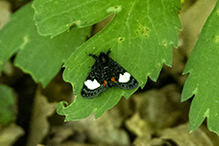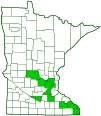Grapevine epimenis
(Psychomorpha epimenis)
Conservation • Description • Habitat • Ecology • Distribution • Taxonomy
| Hodges # | 9309 |
||
Conservation Status |
|||
| IUCN Red List | not listed |
||
| NatureServe | N5 - Secure |
||
| Minnesota | not listed |
||
Description |
Grapevine epimenis is an uncommon but easily recognized forester moth. It occurs in the United States east of the Great Plains and in adjacent Canadian provinces. In Minnesota it is uncommon in the southern half of the state, absent from the north. The larvae feeds on grape leaves. It creates a shelter by folding over the edge of a leaf and securing it with silk. It feeds within the shelter. Adults are found from March to June in woodlands, at forest edges, and on hedgerows. The adult is ½″ to 9⁄16″ (12 to 14 mm) long and has a ⅞″ to 1 1⁄16″ (22 to 27 mm) wingspan. The body and is jet black and covered with short soft hairs giving it a velvety appearance. The forewing is black and is dusted with small white specks and metallic blue scales. The blue scales are visible only when viewed at an angle. There is a single large white patch in the median area. The patch is notched on the inside by the bottom of the kidney-shaped spot (reniform spot). The circular spot in the upper median area (orbicular spot) and the reniform spot are black and free of white specks and blue scales but still difficult to separate from the similarly colored background. There is a dense band of metalic blue scales in the submarginal area. The hindwing is mostly black and only slightly dusted with white specks and metalic blue scales. There is a broad orange, reddish-orange, or yellowish-orange patch and a broad black margin on the outer third of the hindwing. The larvae (caterpillar) is white with black and orange markings, and is about 1″ (2.5 cm) long. The head is orange with black spots. Abdominal segments 1 through 7 each have three narrow black horizontal bands. The membrane between each segment also has a black band. Abdominal segment 8 is humped and has an orange patch above (distally). The orange cap has several large, round, black spots. The leg-like abdominal structures (prolegs) are waxy orange with black spots. The thorax is similarly colored and has an orange plate (prothoracic shield) above. |
Size |
Total length: ½″ to 9⁄16″ (12 to 14 mm) Wingspan: ⅞″ to 1 1⁄16″ (22 to 27 mm) |
Similar Species |
Habitat |
Woodlands, forest edges, hedgerows |
Ecology |
Season |
One generation per year: March to June |
Behavior |
The larva creates a shelter by folding over the edge of a leaf and securing it with silk. It feeds within the shelter. |
Life Cycle |
The pupa bore into rotten wood to overwinter. |
Larva Hosts |
Leaves of silverleaf grape and wild grape |
Adult Food |
Flower nectar |
Distribution |
||
|
Sources 7, 21, 27, 29, 30, 75, 82, 83. Biodiversity occurrence data published by: Minnesota Biodiversity Atlas (accessed through the Minnesota Biodiversity Atlas Portal, bellatlas.umn.edu, 9/12/2025). |
|
| 9/12/2025 | ||
Occurrence |
||
|
||
Taxonomy |
|
Order |
|
Superfamily |
Noctuoidea (Owlet Moths and Allies) |
Family |
Noctuidae (Cutworm Moths and Allies) |
Subfamily |
Agaristinae (forester moths) |
Genus |
Psychomorpha |
Subordinate Taxa |
|
grapevine epimenis (Psychomorpha epimenis epimenis) grapevine epimenis (Psychomorpha epimenis euryrhoda) |
|
Synonyms |
|
Psychomorpha euryrhoda |
|
Common Names |
|
grapevine epimenis grapevine epimenis moth (adult) |
|
Glossary
Orbicular spot
A circular spot or outline in the upper median area near the antemedial line on the forewing of many moths.
Proleg
A fleshy structure on the abdomen of some insect larvae that functions as a leg, but lacks the five segments of a true insect leg.
Prothoracic shield
The hardened plate on the dorsal surface of the first segment of the thorax.
Reniform spot
A kidney-shaped spot or outline in the lower median area near the PM line on the forewing of many moths.
Visitor Photos
Share your photo of this insect.
This button not working for you?
Simply email us at info@MinnesotaSeasons.com.
Attach one or more photos and, if you like, a caption.
|
||
MinnesotaSeasons.com Photos
 |

Slideshows

Visitor Videos
Share your video of this insect.
This button not working for you?
Simply email us at info@MinnesotaSeasons.com.
Attach a video, a YouTube link, or a cloud storage link.
Other Videos

Visitor Sightings
Report a sighting of this insect.
This button not working for you?
Simply email us at info@MinnesotaSeasons.com.
Be sure to include a location.
Minnesota Seasons Sightings

